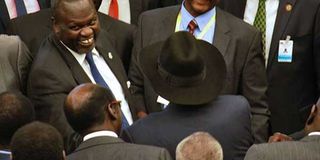US warns South Sudan president Salva Kiir over refusal to sign peace deal

Rebel chief Riek Machar (left) and South Sudan's President (in hat) attend peace deal talks in Addis Ababa on August 17, 2015. AFP PHOTO | STRINGER
What you need to know:
- Kiir had warned from the start of talks that it would be impossible to sign a credible peace deal because rebel forces have split.
- South Sudan's civil war erupted in December 2013, when Kiir accused his former deputy Machar of planning a coup.
- Earlier in August 2015, President Barack Obama pressured Kiir and Machar to reach a deal by Monday August 17, 2015.
- But so far, the threat of sanctions, an arms embargo, travel bans or the freezing of assets have not had any effect
WASHINGTON
The United States on Monday urged South Sudan's president to sign a peace deal with rebels within two weeks to end 20 months of brutal civil war.
While rebel chief Riek Machar signed the accord, President Salva Kiir and his government did not, with a mediator saying they had "certain reservations" and would return within 15 days after consultations.
"The United States deeply regrets that the government of South Sudan chose not to sign an agreement that was supported by all of the states in the Igad plus the troika — the United States, United Kingdom and Norway, China, the African Union and the United Nations today," said US State Department spokesman John Kirby.
"We call on the government to sign the agreement within the 15-day period it requested for consultations."
Kiir had warned from the start of talks that it would be impossible to sign a credible peace deal because rebel forces have split.
The regional eight-nation bloc Igad, the Intergovernmental Authority on Development, as well as the United Nations, the AU, China and the "troika" of Britain, Norway and the United States mediated the talks for 10 days.
NO AGREEMENT SIGNED
"As the president has stated, if there was no agreement signed today, we would consider ways to raise the cost for intransigence," Kirby said.
He added that Washington would "work with our regional and international partners on next steps and on ways to increase pressure, especially against those that are undermining the peace process or opposing this agreement."
South Sudan's civil war erupted in December 2013, when Kiir accused his former deputy Machar of planning a coup, setting off a cycle of retaliatory killings that has split the poverty-stricken, landlocked country along ethnic lines.
At least seven ceasefires have already been agreed to and then shattered within days, if not hours, in the world's newest country, which broke away from Sudan in 2011.
Earlier in August 2015, President Barack Obama pressured Kiir and Machar to reach a deal by Monday, August 17, 2015, and Washington has repeatedly called for an end to the fighting that has killed tens of thousands of people.
But so far, the threat of sanctions, an arms embargo, travel bans or the freezing of assets have not had any effect.





